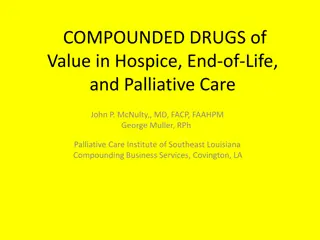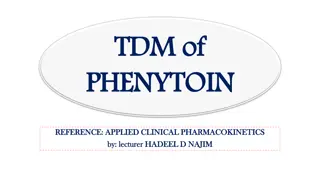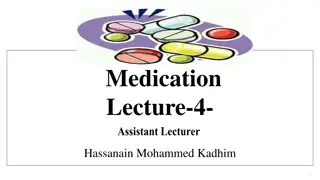Anticonvulsants drugs
Phenytoin is an anticonvulsant drug used for various seizure disorders. It acts by inactivating sodium ion channels to reduce neuronal firing. The medication's kinetics, serum concentration-related side effects, and monitoring issues are essential aspects to consider when administering Phenytoin.
1 views • 39 slides
Compounded Drugs in Hospice and Palliative Care: Enhancing Patient Comfort
Explore the utilization of compounded drugs in hospice and palliative care settings, focusing on addressing complex clinical issues like wounds, pain, infections, and more. Discover how medications like Phenytoin and Morphine are customized to alleviate symptoms and improve quality of life for termi
0 views • 20 slides
Understanding Phenytoin Therapy - Clinical Pharmacokinetics and Serum Concentrations
Phenytoin, a medication with high protein binding and hepatic metabolism, exhibits saturated pharmacokinetics with a narrow therapeutic range of 10-20 µg/mL for total serum concentrations. Adverse effects vary with serum levels: minor CNS depression at >15 µg/mL, nystagmus at >20 µg/mL, and ataxi
0 views • 55 slides
Understanding Trigeminal Neuralgia: Symptoms, Diagnosis, and Treatment Options
Trigeminal neuralgia, also known as "tic douloureux," is characterized by sudden, sharp facial pain that can be triggered by various factors. It predominantly affects middle-aged and elderly women. Diagnosis involves recognizing distinct pain patterns and ruling out other causes of facial pain. Trea
0 views • 15 slides
Understanding Medication Administration and Drug Calculations
Exploring the fundamentals of medication administration, including types of medication, common drug groups, the importance of the "Six Rights," common drug abbreviations, routes of administration, and drug calculation formulas. Examples provided for dosage calculations using Metoprolol and Phenytoin
0 views • 22 slides



